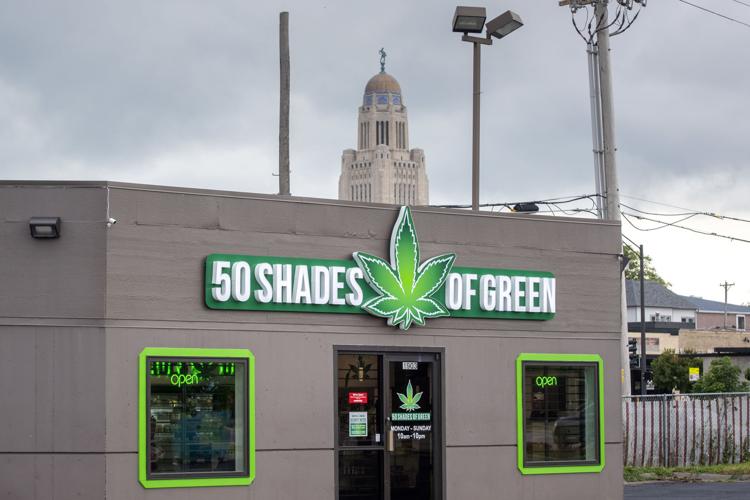
Nebraska Attorney General Mike Hilgers (left) talks about his legislative priorities next to Sen. Carolyn Bosn during a news conference in January. Hilgers supports a bill (LB1191) from Sen. Danielle Conrad to repeal a law giving the attorney general power to sue to invalidate statutes they believe are unconstitutional.
At the request of Nebraska's attorney general, a state lawmaker will introduce a bill this week seeking to outlaw the sale and use of Delta-8 and similar THC products in the state, Attorney General Mike Hilgers announced Thursday.
Sen. Teresa Ibach's bill — which hasn't yet been filed with the Legislature's clerk but was outlined at a news conference Thursday morning — marks the state's latest attempt to crack down on the hemp-derived cannabinoid, which has been available at various dispensary-type shops in Nebraska for nearly three years.

Ibach
Though marijuana remains illegal in Nebraska even for medical use, a provision in the 2018 Farm Bill federally legalized the regulated production of hemp. The law requires that the plant contain no more than 0.3% of Delta-9 THC, but no limits were placed on the hundreds of other cannabinoids present in hemp, including Delta 8, essentially creating a loophole for businesses to sell it.
People are also reading…
Hilgers in October hinted that he intended to close that loophole when he remarked that Delta-8 "shouldn’t be sold at all" as he announced a series of consumer protection lawsuits his office filed against THC retailers in at least 10 counties across the state.
Those lawsuits followed a string of police raids in August targeting Delta-8 shops across the state, which appear to have been coordinated by Hilgers' office, which has declined to comment on the seizures carried out by police.
At Thursday's news conference where the attorney general announced the bill and two other of his office's legislative priorities, Hilgers insisted Delta-8 retailers are operating only in a "perceived loophole" that, he said, does not actually exist within state law.
His office nonetheless partnered with Ibach to introduce the legislation meant to make clear that Delta-8 and similar products are contraband in Nebraska.
"I think making sure that there is no uncertainty as to what the rules of the road are, I think, will help those retailers and will create a statewide solution," Hilgers said, adding: "I want to be clear: our view is that the current law does not allow the sale of Delta-8. People are exploiting what they perceive to be a loophole in the law."

Sen. Teresa Ibach of Sumner speaks during a news conference with Nebraska Attorney General Mike Hilgers (center) and Sen. Carolyn Bosn of Lincoln on Thursday. Ibach will introduce a bill seeking to outlaw the sale of Delta-8 and similar THC products in the state, one of the attorney general's priorities.
Hilgers, who served in the Legislature before he was elected attorney general in 2022, was among senators who in 2019 voted for the Nebraska Hemp Farming Act that brought the state in alignment with federal law.
That act gave the state's Department of Agriculture the authority to regulate the growing, processing, handling and brokering of hemp in Nebraska — and created the "perceived loophole" that Ibach's bill would close.
Facing questions over why the sale of THC products has continued in Nebraska if the loophole doesn't exist in statute, Hilgers said it "can be difficult to ... actually enforce a criminal prosecution" given what he cast as a "high bar" for prosecution.
"And so the consumer (protection lawsuit) aspect that we've taken so far, we think, is a much more efficient litigation strategy," he said. "But the truth is that to the extent that anyone thinks there is a perceived loophole, we just need to close the loophole and make sure everyone knows that there's no opportunities to sell these types of products."
Ibach said her bill, if made law, would also transfer regulation of hemp farming in the state back to the U.S. Department of Agriculture, which she said is more equipped to regulate hemp farming.
She clarified that the production of hemp in Nebraska would remain legal under the bill, as would the sale of CBD products.
"We do not want to inhibit the sale of CBD products, because it's a legal product," she said. "But we want to cap it there. We want only CBD products to be sold."
If Ibach's bill becomes law, Delta-8 and similar hemp derivatives would be considered marijuana, which remains criminalized in Nebraska in all quantities, at least to some degree. In Lincoln, possession of less than an ounce of marijuana is an infraction punishable by a fine.

50 Shades of Green, an Omaha-based dispensary that sells CBD and Delta 8 products, opened this shop at Antelope Valley Parkway and O Street in May 2021.
Hilgers — who has pinned his opposition to Delta-8 and other cannabinoids on their mysterious production processes, mislabeling, unknown health effects and deceptive marketing — said Thursday that his crusade to outlaw the products had not caused him to rethink his opposition to legalized marijuana.
"In fact, if it does anything, it makes me double down on that opposition," he said. "These types of compounds — Delta-8 in particular — have significant health impacts on people. They're dangerous to children."
Still, the bill is likely to draw flak from the state's proponents of legalized marijuana.
Organizers of the latest bid to legalize cannabis for medical use through a petition drive, who , pointed to the state's October lawsuits against retailers as evidence as evidence in support of their own cause.
"This is exactly why we have been pushing to legalize medical marijuana for the past five years so that we can have a safe and accessible regulatory system," former state Sen. Adam Morfeld, a co-sponsor of the latest petition drive seeking to put the issue to voters, said in a social media post in October.
Sen. Loren Lippincott of Central City introduced a bill (LB972) Thursday that would prohibit certain types of kratom as a controlled substance. Derived from the leaf of a tropical evergreen tree in Southeast Asia, the herbal substance is often sold in the same shops that offer Delta-8 in Nebraska.
Ibach's THC bill is among three of Hilgers' priorities in the 2024 legislative session, which kicked off Wednesday and is scheduled to end in April.
Lincoln Sen. Carolyn Bosn introduced another of the attorney general's priorities Thursday when she put forward LB934, which would allow civil judges to freeze assets linked to fraud or deceptive practice cases being pursued by Hilger's office under the Consumer Protection Act.
The bill would also allow the attorney general to pursue jury trials in consumer protection cases.
And Sen. Christy Armendariz of Omaha is set to bring a bill that would allow Hilgers' office to pursue legal action against internet content providers when those websites allow depiction of seemingly non-consensual sex to be shared on or distributed through their websites, Hilgers said.
Photos: Nebraska Legislature gavels in for first day of 2024 session

Sen. Loren Lippincott of Central City (right) speaks to Sen. Rick Holdcroft of Bellevue during the first day of the Nebraska Legislature on Wednesday.

Sen. Tom Brandt (left) of Plymouth speaks to Sen. John Cavanaugh of Omaha during the first day of the Nebraska Legislature on Wednesday.

Sens. Anna Wishart of Lincoln (from left), Megan Hunt of Omaha and Danielle Conrad of Lincoln stand together during the first day of the Nebraska Legislature on Wednesday at the Capitol.

Clerk of the Legislature Brandon Metzler (right) collects a ballot for the chairperson of the Executive Board from Sen. Eliot Bostar of Lincoln during the first day of the Legislature on Jan. 3.

Sen. John Fredrickson of Omaha (left) embraces Sen. Barry DeKay of Niobrara during the first day of the Legislature on Wednesday.

Senators and the public stand during the presentation of colors at the Capitol on Wednesday, the first day of the 2024 legislative session.

Sen. Justin Wayne of Omaha (right) speaks to Sen. Terrell McKinney of Omaha during the first day of the Legislature on Wednesday.

Sen. John Lowe of Kearney smiles during the first day of the Legislature on Wednesday at the Capitol.

Sens. Rick Holdcroft of Bellevue (from left), Sen. Loren Lippincott of Central City, and Barry DeKay of Niobrara stand for the Pledge of Allegiance during the first day of the Legislature on Wednesday.

Sen. Raymond Aguilar of Grand Island nominates himself to be chairperson of the Executive Board during the first day of the Legislature on Wednesday.

Sen. Fred Meyer of St. Paul (left) speaks to Sen. Mike McDonnell of Omaha during the first day of the Legislature on Wednesday.

Sen. Tony Vargas of Omaha (left) speaks to Sen. Teresa Ibach of Sumner during the first day of the Legislature on Jan. 3. Senators will start debating technical and noncontroversial rules changes on Thursday.

Speaker John Arch of La Vista addresses his colleagues during the first day of the Legislature on Wednesday. Arch has scheduled as many as seven days on the legislative calendar for a rules debate.


















